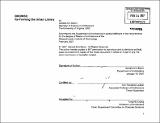Browse : re-forming the urban library
Author(s)
Baron, Sandra Ann
DownloadFull printable version (38.98Mb)
Alternative title
Re-forming the urban library
Other Contributors
Massachusetts Institute of Technology. Dept. of Architecture.
Advisor
Ann Pendleton-Jullian.
Terms of use
Metadata
Show full item recordAbstract
The urban library has persisted as a cultural entity, largely because its interiorized form functions as a vault, creating a clear, although often intimidating, boundary between library program and the public realm. While preserved in its laudable functions, the library has met significant challenges with the emergence of new forms of media and technology. The introduction of the television, and more importantly the internet, as popular means of gathering information translates into a complete transformation of the acquisition process into mere fleeting engagements with mass media. The viewpoints and opinions of those few who shape the media are imparted upon the masses. In comparison, the library presents information not only with the benefit of multiple perspectives, but also with the necessary context provided through related subject matters. The challenge therefore becomes one of making available to the general public the great wealth of intellectual resources that the library provides. While some recent library designs have experimented with using the library's very competition to save it from extinction and have essentially contaminated the library with programs from outside the "vault," these attempts have for the most part been unsuccessful. (cont.) The key to reinventing the urban library, I argue, is structuring a new relationship between the highly sensory and immediate experience of the media and the comprehensive material the library has to offer. The crucial bridge between these seemingly disparate methods of acquiring information is the act of browsing. The curiosity that an individual has in one subject matter branches out to create an entirely new area of understanding and ends in a new ability to generate particular opinions. The new urban library therefore becomes structured as an urban interface to facilitate the act of browsing. The community becomes involved in all aspects of the organization of the library so that the interface reflects the very interests of the various constituencies who pass through the library on a daily basis. The library may no longer bear a precise resemblance to libraries of old, stoic reading rooms and monumental facades, but the objectives of this institution will persist for the benefit of future generations.
Description
Thesis (M. Arch.)--Massachusetts Institute of Technology, Dept. of Architecture, 2007. Includes bibliographical references (p. 97-101).
Date issued
2007Department
Massachusetts Institute of Technology. Department of ArchitecturePublisher
Massachusetts Institute of Technology
Keywords
Architecture.